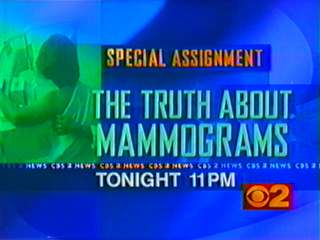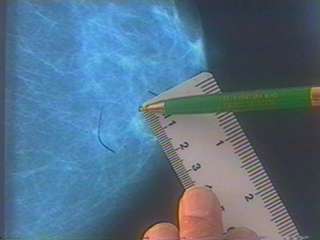 |
 |
 |
 |
| |
||||
The Truth About MammogramsA CBS 2 News Special Assignment Breast cancer kills thousands of American women every year, and mammography is the best way we have to find it in its early stages. But our own government has been debating whether they're good for women in their forties: are they a benefit, or are they useless? CBS 2 News' Ann Martin talked with some breast cancer survivors in their 40s who discuss the issue. Breast cancer kills thousands of American women every year, and mammography is the best way we have to find it in its early stages. But our own government has been debating whether they're good for women in their forties: are they a benefit, or are they useless? CBS 2 News' Ann Martin talked with some breast cancer survivors in their 40s who discuss the issue. Special Assignment: The Truth About Mammograms aired Monday, May 5 at 11 p.m. "I literally felt a lump like a grape cut in half under my skin," says Cathy. "I felt a lump and the size of the lump was seven by four and a half centimeters," says Catherine. "I think the size of a small egg�" "I had a lump in my breast about five centimeters," says Linda. What many people don't know, reports Martin, is that 80 percent of breast cancer is not genetic. This means that women should take as many steps as possible to protect themselves. One important safeguard: the mammogram, which is an X-ray picture of the breast (pictured). These mammograms can identify abnormalities, such as very small lumps, areas of calcification, or other changes before they can be felt by a women or her physician. CBS 2 News' Michelle Gillen, with the help of California lawmakers, pushed the NCI to reinstitute mammography guidelines. But the debate has left women confused and asking, "Do I need a mammogram every year or not?" Here is why doctors are arguing the issue. First, women under 50 do get breast cancer. More than 32,000 women in their 40s will be diagnosed with breast cancer in the U.S. this year, reports Martin. And that number is only 18 percent of all the women who will be told this year that they have breast cancer. Therefore, doctors say because the frequency of breast cancer is so much less in younger women, it takes a lot more mammograms in younger women to find the same number of cancers as in older women. In addition, younger women have more dense breast tissue, which means their X-rays are harder to interpret. It's also more likely that they'll require expensive follow-up tests. That means more tests to find fewer cancers - and this fact can lead to a cost-effectiveness mentality in the decision-making process. "You can't not do it," says Cathy. "You can't afford not to do it because if it doesn't get detected early it'll kill you. And I found it at 43 and would still like another 43 years." One woman interviewed said that mammograms are wonderful, but pointed out that doctors' exams and self-exams are also needed. And while doctors say it's a mammogram is a test that works, they caution that a test is only as good as the people who apply it. For a mammogram to be optimally effective, high-quality technology, high-quality film, and a high-quality reading are necessary. If one of those links are weak, a mammogram could miss a cancer. Another twist on the debate is insurance. One of the women interviewed said her insurance company only covered one mammogram every two years from age 40 to 49. As she put it, "One every two years! Now that's a long time for a tumor to be growing." One solution offered: if insurance doesn't cover the cost, try to negotiate directly with the doctor and working out a payment plan or ask for a reduction in the fee. The bottom line, Martin discovered through talking with the survivors, is that breast cancer doesn't spell a death sentence if it's discovered soon enough. "There's treatment for it," says Catherine. "Thank God, there's treatment for it." More Information:
|
|
 |
|
|
Retire Rich
 |

 |
||
|
12 p.m.
Woman 2 Woman One of the stars from "Judging Amy" 5 p.m. 6 p.m. 11 p.m.
|
||
 |
||
|
4-5 p.m.
Judge Judy Ruler Of The Free World! 8:00 p.m. 8:30 p.m.
9:00 p.m.
|
||
| |
||
 Listen to three women talk about a frightening rite of passage. They are all in their forties. And they are all survivors of breast cancer.
Listen to three women talk about a frightening rite of passage. They are all in their forties. And they are all survivors of breast cancer.  Ann Martin (pictured) helmed CBS 2 News' investigation into mammograms, and for her, the assignment was personal. Martin lost both her mother and grandmother to breast cancer.
Ann Martin (pictured) helmed CBS 2 News' investigation into mammograms, and for her, the assignment was personal. Martin lost both her mother and grandmother to breast cancer.  One doctor Martin spoke to advocated that women between ages 40 and 49 get a mammogram every year. But just over three years ago, the National Cancer Institute said they didn't think there was sufficient benefit to justify yearly exams. They dropped their recommendation that women in their 40s have mammograms.
One doctor Martin spoke to advocated that women between ages 40 and 49 get a mammogram every year. But just over three years ago, the National Cancer Institute said they didn't think there was sufficient benefit to justify yearly exams. They dropped their recommendation that women in their 40s have mammograms.  But try telling a breast cancer survivor in her 40s that yearly mammograms for her age group are not cost-effective, says Martin. This group of survivors begs to differ.
But try telling a breast cancer survivor in her 40s that yearly mammograms for her age group are not cost-effective, says Martin. This group of survivors begs to differ. 

